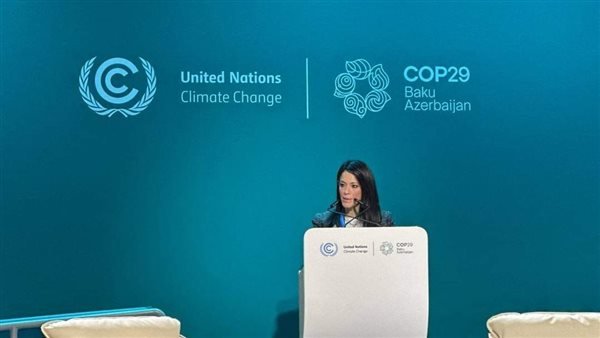
Dr. Rania Al-Mashat, Minister of Planning, Economic Development and International Cooperation, said that more than $11 billion in soft financing has been directed to the private sector since 2020, including companies working on climate-related projects, enhancing their role in economic development efforts and the green transition. In Egypt.
She added that the Ministry is working to expand the role of the private sector in climate action, and is using a set of direct and indirect mechanisms to enhance private sector participation in climate action, while recognizing the stimulating role of concessional financing, in mobilizing additional resources and encouraging private climate finance.
This came during the participation of Dr. Rania Al-Mashat, Minister of Planning, Economic Development and International Cooperation, in the launch activities of the decision of the high-level expert group on “Raising ambition and accelerating progress towards climate finance”, during the activities of the “Finance, Investment and Trade” Day at the COP29 climate conference, held in the capital. Azerbaijani “Baku”, under the slogan “Investing in a livable planet for all”.
Participating in the events were Simon Steele, Executive Secretary of the United Nations Framework Convention on Climate Change, Marissa Drew, Head of Sustainability at Standard Chartered Bank, Mark Bowman, Vice President of Policy and Partnerships at the European Bank for Reconstruction and Development, and Carsten Storr, Chair of the Development Assistance Committee of the European Bank. To the Organization for Economic Co-operation and Development, Ambassador Majid Al Suwaidi, CEO of Altera, Avinash Persaud, Special Advisor on Climate Change to the President of the Inter-American Development Bank, and Chinua Azukubike, CEO of InfraCredit.
The report estimated the expected global investment requirements for climate action at approximately $6.3 to $6.7 trillion by 2030, including $2.3 to $2.5 trillion in developing and emerging countries other than China, in light of the worsening climate change and the increasing volume of financial needs required to enhance resilience.
The Minister of Planning, Economic Development and International Cooperation delivered a speech in which she stressed the importance of developing innovative financing mechanisms to attract the private financing necessary to address the main gaps through the use of public funds. Among these mechanisms is the development of blended financing programs, in addition to the use of guarantees and other tools provided by international financial institutions and banks. Multilateral development, which requires reforming development banking business models to better support efforts to mobilize private finance.
Al-Mashat added that despite rising capital costs and challenges such as trade barriers, private climate financing in emerging markets and developing economies rose from 43% to 47% of total financing, and the energy sector’s share of projects fully financed by the private sector decreased from 97%. To 82%, which indicates diversification into other sectors.
She added that the mechanisms provided to the private sector include loans, equity investments, guarantees, lines of credit, technical support, and capacity building, noting that the ministry launched a “catalyst platform” for consulting, financing, and investments for companies, which works to unify financial and advisory services from international development partners, to mobilize private climate financing, She also referred to the mobilization of private financing through the national platform of the “Novi” program, as the program was launched in 2022 when Egypt was hosting the COP27 Conference of the Parties, and serves as a national platform to facilitate financing for climate action.
She stated that the program contributed to strengthening the mechanisms for mobilizing renewable energy investments, and through it, agreements were concluded to provide concessional financing to the private sector worth more than two billion dollars in the energy sector, which contributed to attracting additional investments, and signing contracts for renewable energy projects with capacities exceeding 3.7 gigawatts.
On the other hand, the Minister of Planning, Economic Development and International Cooperation participated in a discussion session organized by Hitachi Energy Company, on the integration between renewable energy sources, and Andreas Schiernbeck, CEO of Hitachi Energy Company, and Giles Dixon, CEO of Wind Europe, and the session was moderated by Roland Rosich, Director of Innovation and Technology Center at the International Renewable Energy Agency (IRENA).
During the session, Dr. Rania Al-Mashat reviewed Egypt’s efforts to become a regional center for renewable energy through diversifying energy sources and increasing production, so that renewable energy will account for 42% of energy sources in 2030, making it a strong actor in efforts to confront climate change and promote sustainable economic development, explaining Egypt has unique resources to enhance its efforts in the field of renewable energy, pointing to what has been implemented so far within the energy axis of the “Novi” program, which supports Egypt’s efforts in this field through a huge project to add 10 gigawatts of renewable energy and stop about 12 power stations. Traditional.
She also pointed to the government’s efforts to increase the percentage of green projects in the investment plan to reach 40%, with a target of reaching 50% in the coming years, adding that Egypt is implementing a huge project that will be the largest of its kind in the Middle East region to connect electricity with the Kingdom of Saudi Arabia, to enhance energy sources in the two countries. .



